Items filtered by date: August 2022
When Nerve Dysfunction Occurs in Your Feet
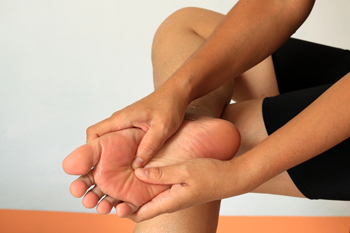
Neuropathy is a general term used to describe dysfunction or disease of the nerves. Peripheral neuropathy is nerve dysfunction that occurs in one or more peripheral nerves (nerves that are not part of the brain or spinal cord). Peripheral neuropathy can be caused by diabetes, genetic disorders, infections, autoimmune diseases, alcoholism, toxins, medications, and tumors, or there may be no known cause. Symptoms of peripheral neuropathy include pain, sensitivity to touch, numbness, tingling, or decreased feeling in the feet, which may make it difficult or impossible to detect developing wounds. If you are experiencing any of these symptoms, make an appointment with a podiatrist. They will examine you and conduct various imaging tests to determine the cause and severity of your condition and the most effective treatment options available to you.
Neuropathy
Neuropathy can be a potentially serious condition, especially if it is left undiagnosed. If you have any concerns that you may be experiencing nerve loss in your feet, consult with Dr. Michael A. Wood from Foot Health Institute. Our doctor will assess your condition and provide you with quality foot and ankle treatment for neuropathy.
What Is Neuropathy?
Neuropathy is a condition that leads to damage to the nerves in the body. Peripheral neuropathy, or neuropathy that affects your peripheral nervous system, usually occurs in the feet. Neuropathy can be triggered by a number of different causes. Such causes include diabetes, infections, cancers, disorders, and toxic substances.
Symptoms of Neuropathy Include:
- Numbness
- Sensation loss
- Prickling and tingling sensations
- Throbbing, freezing, burning pains
- Muscle weakness
Those with diabetes are at serious risk due to being unable to feel an ulcer on their feet. Diabetics usually also suffer from poor blood circulation. This can lead to the wound not healing, infections occurring, and the limb may have to be amputated.
Treatment
To treat neuropathy in the foot, podiatrists will first diagnose the cause of the neuropathy. Figuring out the underlying cause of the neuropathy will allow the podiatrist to prescribe the best treatment, whether it be caused by diabetes, toxic substance exposure, infection, etc. If the nerve has not died, then it’s possible that sensation may be able to return to the foot.
Pain medication may be issued for pain. Electrical nerve stimulation can be used to stimulate nerves. If the neuropathy is caused from pressure on the nerves, then surgery may be necessary.
If you have any questions, please feel free to contact one of our offices located in Lansing, and Chicago, IL . We offer the newest diagnostic and treatment technologies for all your foot care needs.
What to Avoid in Foot Care
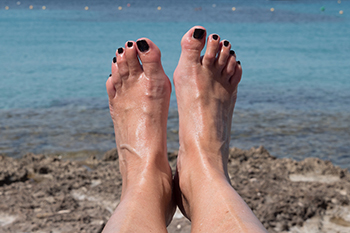
Many individuals who take their health seriously make a special effort to look after the state of their feet on a daily basis. Having some sort of everyday foot care routine can be a very helpful way to maintain healthy feet and prevent complications from arising. There is certainly no shortage of recommended things to incorporate into your foot care routine. However, equally important are things to avoid doing every day that could negatively impact the health of your feet. First, you might avoid ignoring any pain or problems in your feet. Sometimes, you might feel tempted to dismiss any discomfort that could arise in your feet. However, it can be better to have a medical professional, such as a podiatrist, examine your feet when you notice anything abnormal. Second, you usually ought not to wear the same pair of shoes and socks day after day. When an individual fails to alternate their shoes and socks, it becomes very easy for bacteria, odors, and infections to take hold. Additionally, the sweat that accumulates when one fails to alternate shoes and socks can cause complications. These are just some of the many things that most people ought to avoid as part of their everyday foot care routine. For more information, please contact your podiatrist.
Everyday foot care is very important to prevent infection and other foot ailments. If you need your feet checked, contact Dr. Michael A. Wood from Foot Health Institute. Our doctor can provide the care you need to keep you pain-free and on your feet.
Everyday Foot Care
Often, people take care of their bodies, face and hair more so than they do for their feet. But the feet are a very important aspect of our bodies, and one that we should pay more attention to. Without our feet, we would not be able to perform most daily tasks.
It is best to check your feet regularly to make sure there are no new bruises or cuts that you may not have noticed before. For dry feet, moisturizer can easily be a remedy and can be applied as often as necessary to the affected areas. Wearing shoes that fit well can also help you maintain good foot health, as well as making it easier to walk and do daily activities without the stress or pain of ill-fitting shoes, high heels, or even flip flops. Wearing clean socks with closed shoes is important to ensure that sweat and bacteria do not accumulate within the shoe. Clean socks help to prevent Athlete’s foot, fungi problems, bad odors, and can absorb sweat.
If you have any questions please feel free to contact one of our offices located in Lansing, and Chicago, IL . We offer the newest diagnostic and treatment technologies for all your foot and ankle needs.
Ways to Diagnose Achilles Tendon Injuries
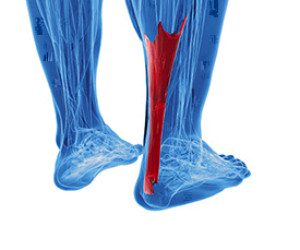
Pain behind the heel is often a sign of an injury to the Achilles tendon. However, finding the exact cause of the pain may require a number of tests. To diagnose an Achilles tendon injury, a podiatrist will start by examining the injured area. A Thompson test involves squeezing the calf to determine the health of the Achilles tendon. The doctor then may ask you to perform a series of physical activities, such as hopping, jumping, or leg lifts, to determine whether the activity causes pain and where it is located. Next, a patient history will be conducted to note any past Achilles tendon injuries or inflammation, as well as a list of your activities. An MRI (magnetic resource imaging) or ultrasound test may also be used to get a detailed look at the tendon or to rule out other injuries or conditions. An X-ray may be used to identify still other factors, such as bone spurs, heel bumps, or stress fractures, that could be causing the pain. If you believe you have injured your Achilles tendon, or are experiencing pain in that area, please visit a podiatrist.
Achilles tendon injuries need immediate attention to avoid future complications. If you have any concerns, contact Dr. Michael A. Wood of Foot Health Institute. Our doctor can provide the care you need to keep you pain-free and on your feet.
What Is the Achilles Tendon?
The Achilles tendon is a tendon that connects the lower leg muscles and calf to the heel of the foot. It is the strongest tendon in the human body and is essential for making movement possible. Because this tendon is such an integral part of the body, any injuries to it can create immense difficulties and should immediately be presented to a doctor.
What Are the Symptoms of an Achilles Tendon Injury?
There are various types of injuries that can affect the Achilles tendon. The two most common injuries are Achilles tendinitis and ruptures of the tendon.
Achilles Tendinitis Symptoms
- Inflammation
- Dull to severe pain
- Increased blood flow to the tendon
- Thickening of the tendon
Rupture Symptoms
- Extreme pain and swelling in the foot
- Total immobility
Treatment and Prevention
Achilles tendon injuries are diagnosed by a thorough physical evaluation, which can include an MRI. Treatment involves rest, physical therapy, and in some cases, surgery. However, various preventative measures can be taken to avoid these injuries, such as:
- Thorough stretching of the tendon before and after exercise
- Strengthening exercises like calf raises, squats, leg curls, leg extensions, leg raises, lunges, and leg presses
If you have any questions please feel free to contact one of our offices located in Lansing, and Chicago, IL . We offer the newest diagnostic tools and technology to treat your foot and ankle needs.
Shockwave Therapy May Provide a Break From Heel Pain
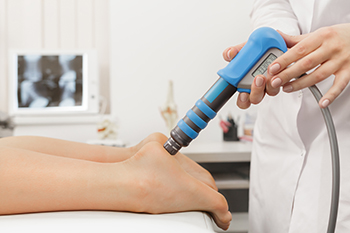
Sound wave technology that is similar to Shockwave Lithotripsy—which has been used to break up kidney stones for decades—can also be very effective in treating plantar fasciitis. Plantar fasciitis is a painful inflammation of the plantar fascia tissue which spans the entire sole connecting the heel with the base of the toes. It is the most common cause of chronic heel pain. When the plantar fascia tissue becomes damaged from overuse the high-energy acoustic sound waves from Extracorporeal shock wave therapy (ESWT) can stimulate healing in the tissue, while reducing inflammation and pain. If you have been suffering from heel pain, make an appointment with a podiatrist for an examination. If you are diagnosed with chronic plantar fasciitis, ask if you are a good candidate for Extracorporeal shock wave therapy.
Shockwave therapy is a treatment commonly used to treat various injuries and conditions, particularly plantar fasciitis in the feet. To learn more, consult with Dr. Michael A. Wood from Foot Health Institute. Our doctor can provide the care you need to keep you pain-free and on your feet.
Shockwave Therapy
Shockwave therapy is a new treatment option designed to treat bone conditions such as tennis elbow, shoulder pain, and others. Shockwave therapy uses high intensity sound waves that are directed to the affected tissues of the body with pinpoint accuracy. The effects are very beneficial, leading to a production of collagen fibers, eliminating inflammation.
Who Benefits from Shockwave?
Shockwave is recommended for patients suffering from heel pain and associated problems. Heel pain is a common condition which can be caused by obesity, overexertion, and spending a substantial amount of time on hard floors with your feet exposed and unsupported.
Fast and Easy
The therapy is actually a simple process that can leave patients feeling better the very next day. Shockwave therapy is not as dramatic as it sounds. It enables more blood flow to effected areas, addressing the source of the problem and allowing treatment to last for a long time.
Treatment & Recovery Time
Shockwave treatment will enable your feet to recover quickly. This is especially important since surgery is not required. It is cost effective and does not require the use of anesthesia. This treatment is a better option to surgery, since it is proven safe.
If you have any questions, please feel free to contact one of our offices located in Lansing, and Chicago, IL . We offer the newest diagnostic and treatment technologies for all your foot and ankle needs.
Why Live with Pain and Numbness in Your Feet?
All About Diabetic Foot Ulcers
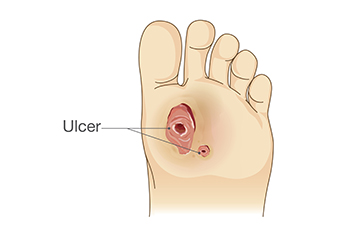
A diabetic foot ulcer is an open sore or wound that affects about 15 percent of people with diabetes. There are two main types of foot ulcers, neuropathic and vascular. High blood sugar levels are thought to be the cause of both types. Being overweight, smoking, and frequently drinking alcohol are other contributing factors. People who have diabetes for years often develop neuropathy, a reduced or limited ability to feel pain in the feet. As a result, sores and cuts, especially on the bottom of the feet, may be overlooked. Vascular inefficiency, a slowed blood flow to the extremities, can reduce the ability of foot ulcers to heal properly, which increases the likelihood of infection. Tissue around a skin ulcer can become blackened, and gangrene may develop. Of those who develop a foot ulcer, up to one-fourth will be at risk of amputation. Fortunately, it is possible to prevent the formation of foot ulcers through a rigorous daily foot care regime. If an ulcer has formed, however, debridement (cutting away of dead tissue), certain medication, sterile dressings, and managing glucose are suggested. For more information on prevention and treatment of foot ulcers, please consult a podiatrist.
Diabetic foot care is important in preventing foot ailments such as ulcers. If you are suffering from diabetes or have any other concerns about your feet, contact Dr. Michael A. Wood from Foot Health Institute. Our doctor can provide the care you need to keep you pain-free and on your feet.
Diabetic Foot Care
Diabetes affects millions of people every year. The condition can damage blood vessels in many parts of the body, especially the feet. Because of this, taking care of your feet is essential if you have diabetes, and having a podiatrist help monitor your foot health is highly recommended.
The Importance of Caring for Your Feet
- Routinely inspect your feet for bruises or sores.
- Wear socks that fit your feet comfortably.
- Wear comfortable shoes that provide adequate support.
Patients with diabetes should have their doctor monitor their blood levels, as blood sugar levels play such a huge role in diabetic care. Monitoring these levels on a regular basis is highly advised.
It is always best to inform your healthcare professional of any concerns you may have regarding your feet, especially for diabetic patients. Early treatment and routine foot examinations are keys to maintaining proper health, especially because severe complications can arise if proper treatment is not applied.
If you have any questions please feel free to contact one of our offices located in Lansing, and Chicago, IL . We offer the newest diagnostic and treatment technologies for all your foot and ankle needs.

